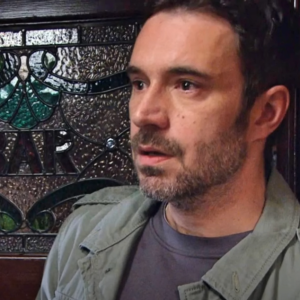The Dales have been gripped by a chilling mystery since the dramatic return of Robert Sugden to Emmerdale. A character once defined by his sharp wit, audacious schemes, and a seemingly unbreakable spirit, Robert has reappeared a shadow of his former self, haunted by an unseen trauma that viewers are now desperately trying to unravel. His erratic behaviour, vivid nightmares, and profound emotional distress point to a horrific ordeal endured during his six-year incarceration, leading fans to speculate with feverish intensity about the dark secrets he holds and the potential for a groundbreaking flashback episode to finally expose the truth.
From the moment Robert stepped back into the familiar landscape of the village, it was clear that the man who left was not the man who returned. His once steely resolve has been replaced by a pervasive anxiety, his confidence shattered, and his very presence now exudes a deeply unsettling vulnerability. Viewers have witnessed him battling crippling nightmares, waking in a cold sweat, often lashing out in a desperate attempt to fend off unseen attackers. These unsettling nocturnal episodes, punctuated by shouts and sudden movements, are not merely the consequence of confinement; they speak to a specific, deeply scarring event that has left an indelible mark on his psyche.
His sister, Victoria Sugden, has been at the forefront of this unfolding drama, her concern for Robert growing with each passing day. Her pleas for him to seek help, to open up about the torment he clearly harbours, have met with stubborn resistance, yet they underscore the severity of his condition. Robert’s spiralling mental health has cast a dark cloud over the Sugden family, forcing them to confront a version of their beloved brother they barely recognise. This shift in Robert’s character, from the headstrong and often formidable individual he once was to a man teetering on the brink, represents a profound and disturbing transformation that has ignited a torrent of fan theories.

Central to these theories is the widespread belief that Robert is suffering from Post-Traumatic Stress Disorder (PTSD), a direct consequence of his time in prison. This diagnosis, often associated with combat veterans or victims of severe trauma, seems to fit Robert’s symptoms perfectly. The constant vigilance, the sudden outbursts, the avoidance of anything that might trigger painful memories – all are hallmarks of PTSD. Fans argue that prison, a brutal and unforgiving environment, could easily be the breeding ground for such a condition, especially for someone like Robert, who historically preferred to be in control. What precisely could have happened to inflict such deep psychological wounds on a character previously deemed “unbreakable”?
One of the most chilling pieces of evidence cited by viewers comes directly from Robert himself. In a moment of raw vulnerability, he confessed to Victoria that he “had to get used to sleeping with one eye open” – a stark admission that hints at constant fear, a perpetual state of alert against potential threats. This chilling detail has fueled speculation that Robert was not merely a prisoner, but a target. Many believe he was subjected to relentless bullying, possibly due to his past reputation, his family connections, or, a particularly poignant theory, his sexuality. Emmerdale has historically explored complex social themes, and the idea of a character being victimised within the prison system for being gay would be a powerful and timely narrative. How would a proud, defiant character like Robert, accustomed to fighting back and asserting his dominance, cope with being in a position of utter powerlessness, systematically tormented by fellow inmates? The thought alone is harrowing.
Further theories delve into the darker side of prison hierarchy. Some fans suggest Robert might have been forced to perform “jobs” for more dangerous inmates, becoming entangled in a web of illicit activities just to survive or to get others “off his back.” Yet, as one compelling theory suggests, such concessions might not have worked, leaving him as a “punching bag” regardless. The added layer of Robert’s inherent personality – his tendency to “never shut his mouth” and deliver a sharp comment or two – is also highlighted. This suggests that his defiance, a trait that once defined him, might have ironically exacerbated his torment, earning him more brutal retribution from his aggressors. The thought of Robert, the quick-witted master of comebacks, being beaten for his words, is a stark image that resonates deeply with fans who remember his fiery past.

The recent incident involving Robert attacking Jon, followed by his desperate pleas for Jon not to report him, further solidifies the fan belief that he is utterly terrified of returning to prison. This visceral reaction, disproportionate to the immediate threat, is a clear indicator of deep-seated trauma linked to his incarceration. It’s not just the loss of freedom he fears, but a return to an environment where he experienced profound suffering.
With the mystery deepening, the clamour for a definitive revelation has grown. Viewers are united in their prediction that Emmerdale is building towards a massive reveal, likely through the use of a dramatic flashback episode. The soap has a history of employing flashbacks effectively to unravel complex narratives and traumatic events, and fans are betting heavily on this mechanism to finally shine a light on Robert’s dark past. A dedicated flashback episode, or even a series of shorter, fragmented memories, could transport viewers directly into the harrowing reality of his time behind bars, showing precisely what happened to leave him so broken.
Alternatively, some fans propose a “two-hander” episode, a powerful dramatic device where two characters carry the entire narrative, often through intense, emotionally charged dialogue. This could involve Robert finally confiding in Victoria, or perhaps an unexpected confidante, sharing the gruesome details of his experiences in a raw, unfiltered confession. Such an episode would be a tour-de-force for the actor, Ryan Hawley, allowing for a deep exploration of Robert’s trauma and the emotional fallout.

Adding another layer to the speculation is the brief mention of a mysterious new character named “Kev.” Viewers are already theorising that Kev could be directly linked to Robert’s prison past, perhaps an inmate who was involved in his torment, or even someone who witnessed it. His introduction could either provide a direct catalyst for Robert’s memories to resurface or serve as a constant, looming threat that keeps Robert on edge, forcing him to confront his demons.
This storyline is being hailed by fans not only for its dramatic potential but also for its broader significance within the landscape of soap operas. As one viewer aptly put it, “I feel like soaps don’t really explore the effects of prison on people, so it will be an interesting watch.” Indeed, while incarceration is often a plot device to remove a character temporarily, Emmerdale appears poised to delve into the lasting psychological scars it can inflict. By exploring Robert’s PTSD, the show has the opportunity to offer a nuanced and empathetic portrayal of mental health struggles arising from the prison system, potentially sparking important conversations about rehabilitation, support, and the long-term impact of justice.
The transformation of Robert Sugden from a calculating schemer to a vulnerable, traumatised individual is a testament to Emmerdale’s commitment to character development and its willingness to tackle difficult themes. As viewers eagerly await the promised flashbacks or a heartfelt confession, the collective hope is that Robert will not only confront his past but eventually find a path towards healing. His journey promises to be one of the most compelling and emotionally charged narratives of the year, cementing his status as one of Emmerdale’s most complex and enduring characters. The truth, however dark, is just waiting to be revealed.





